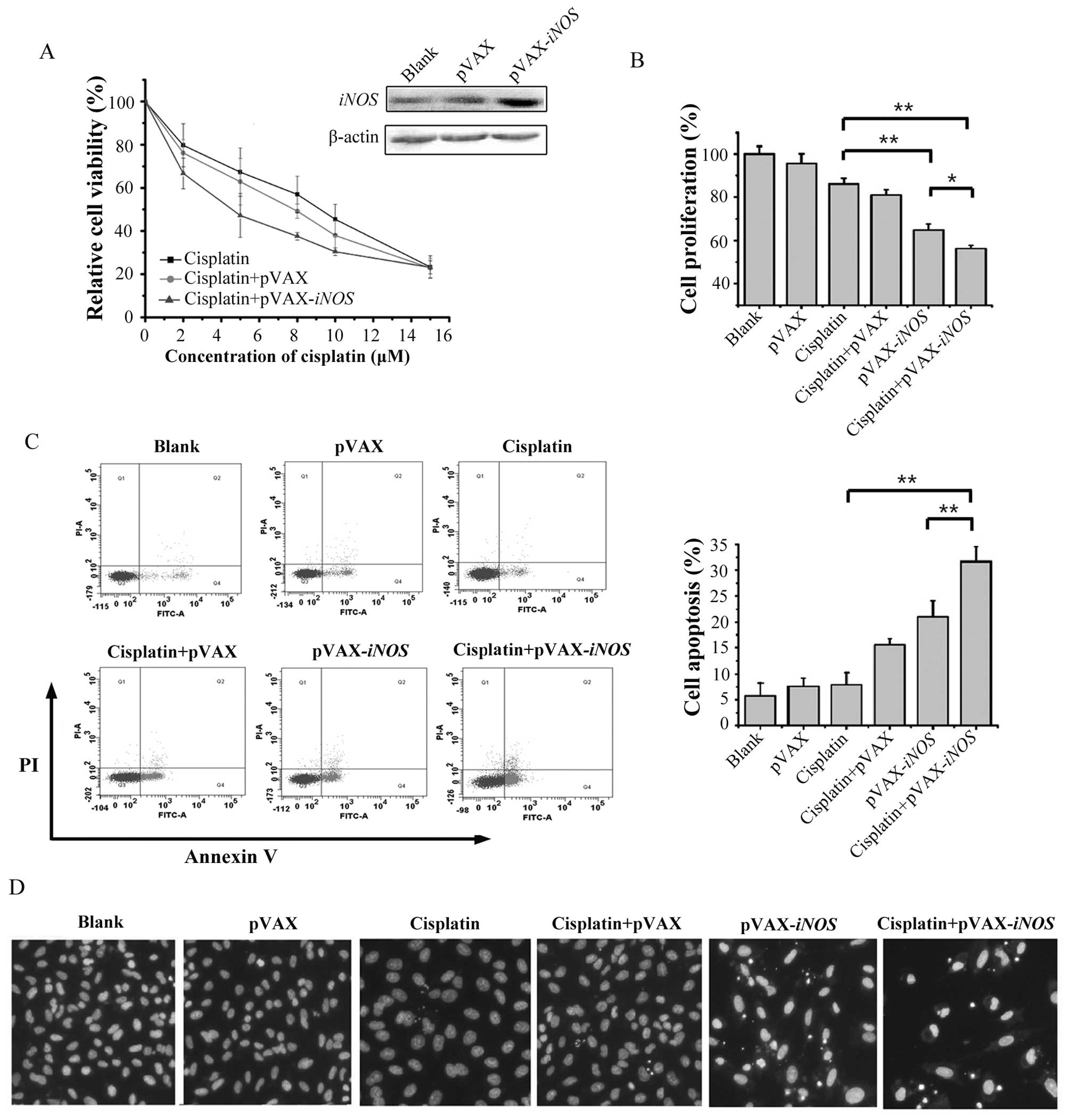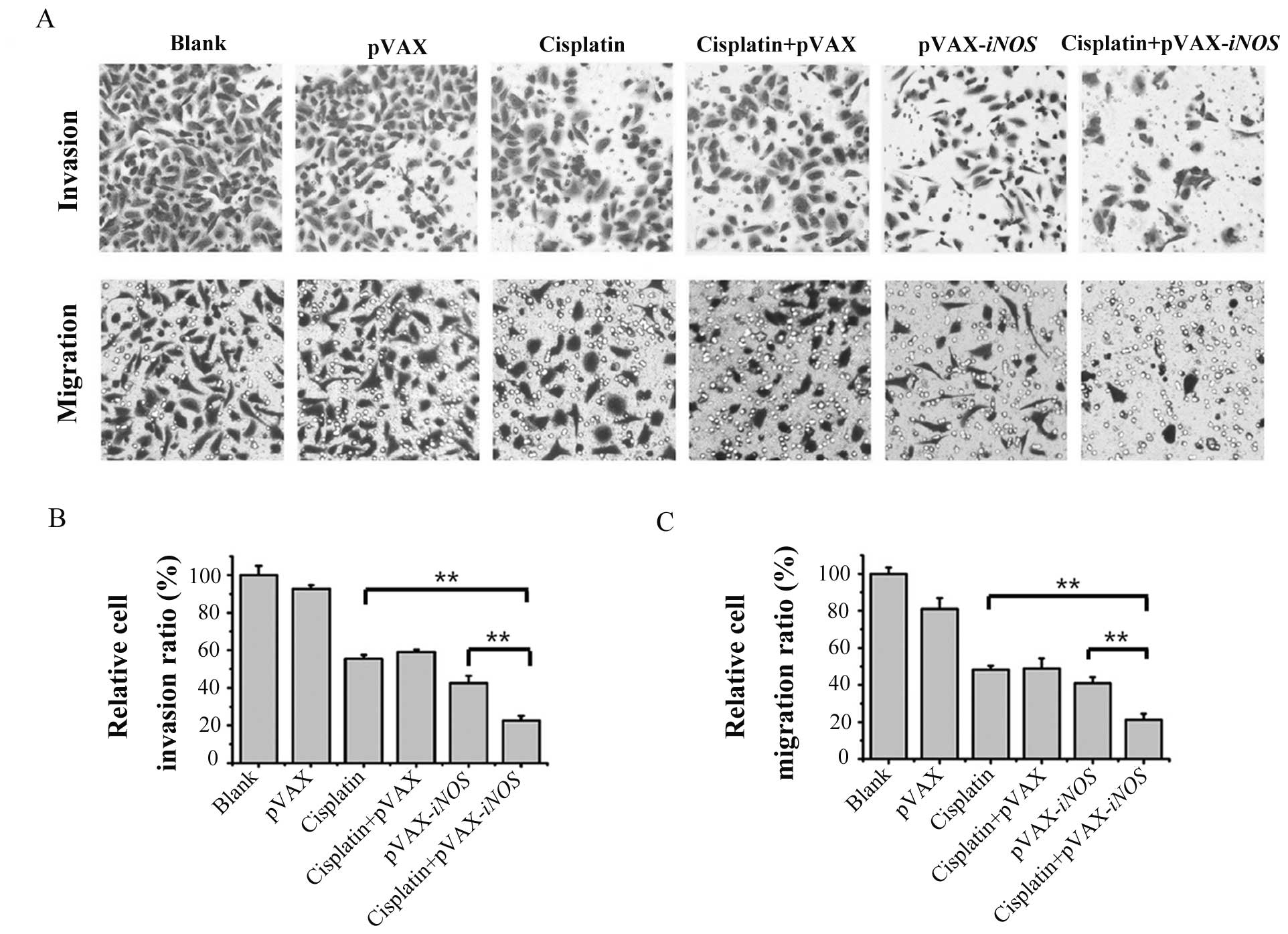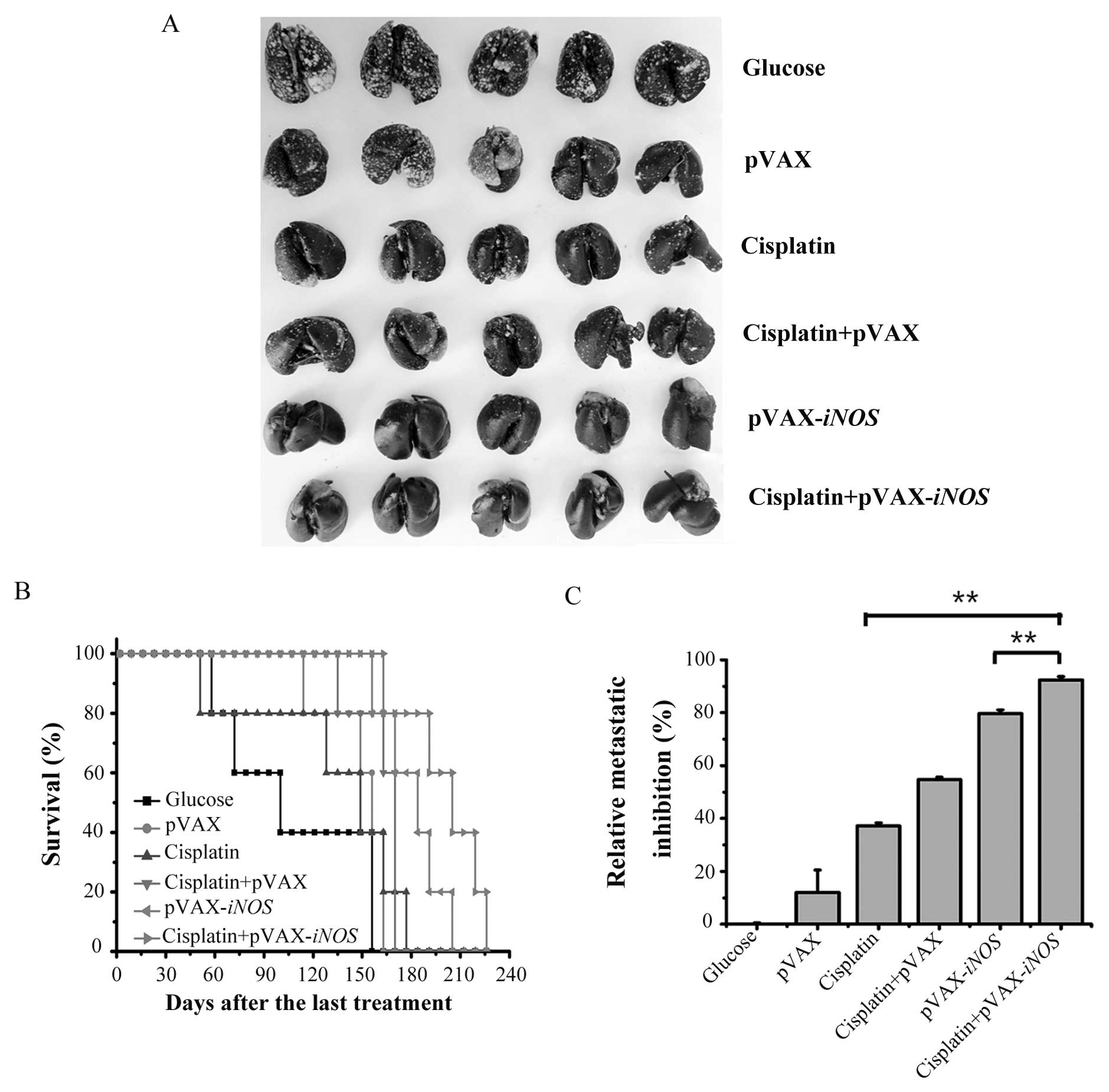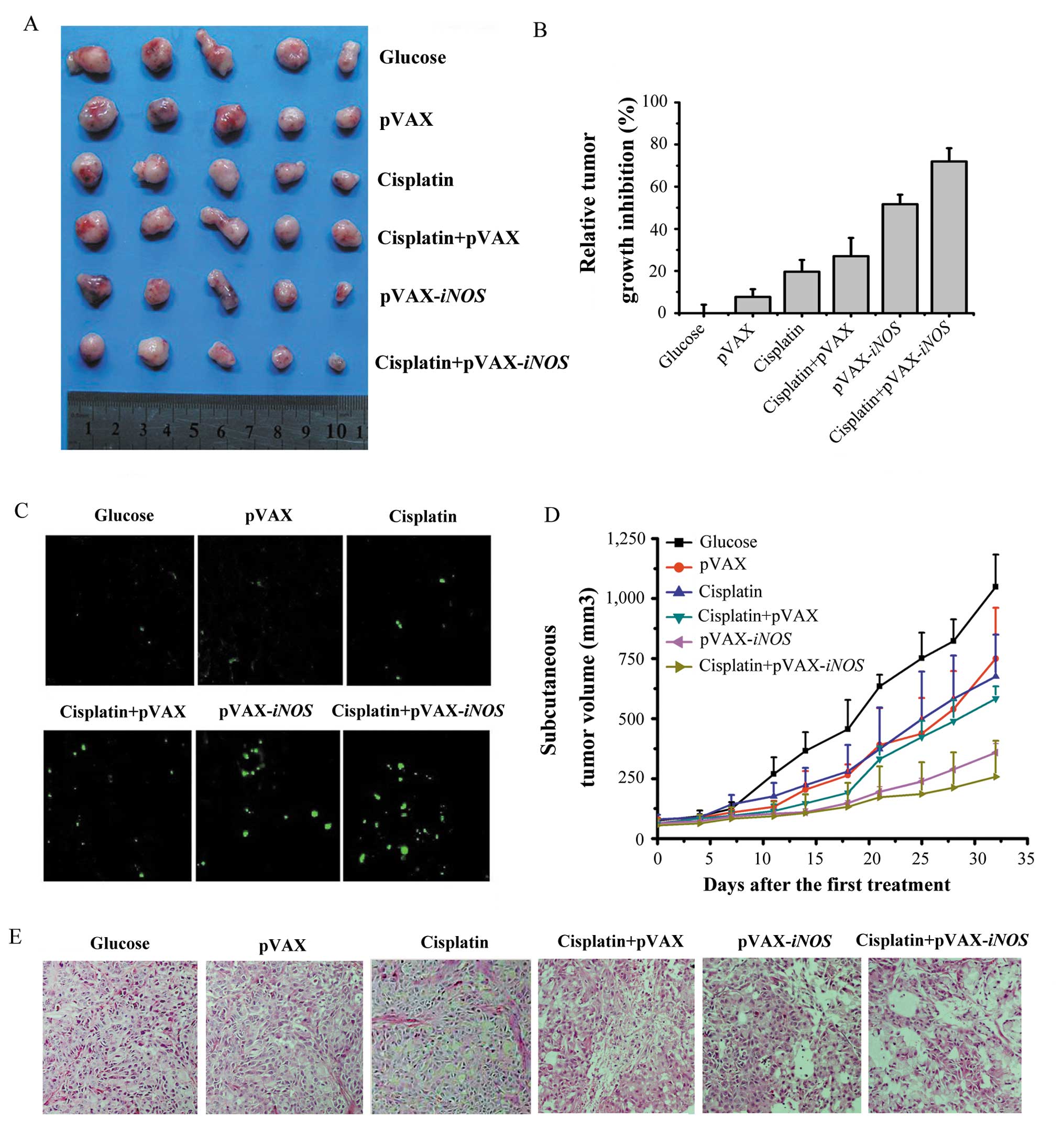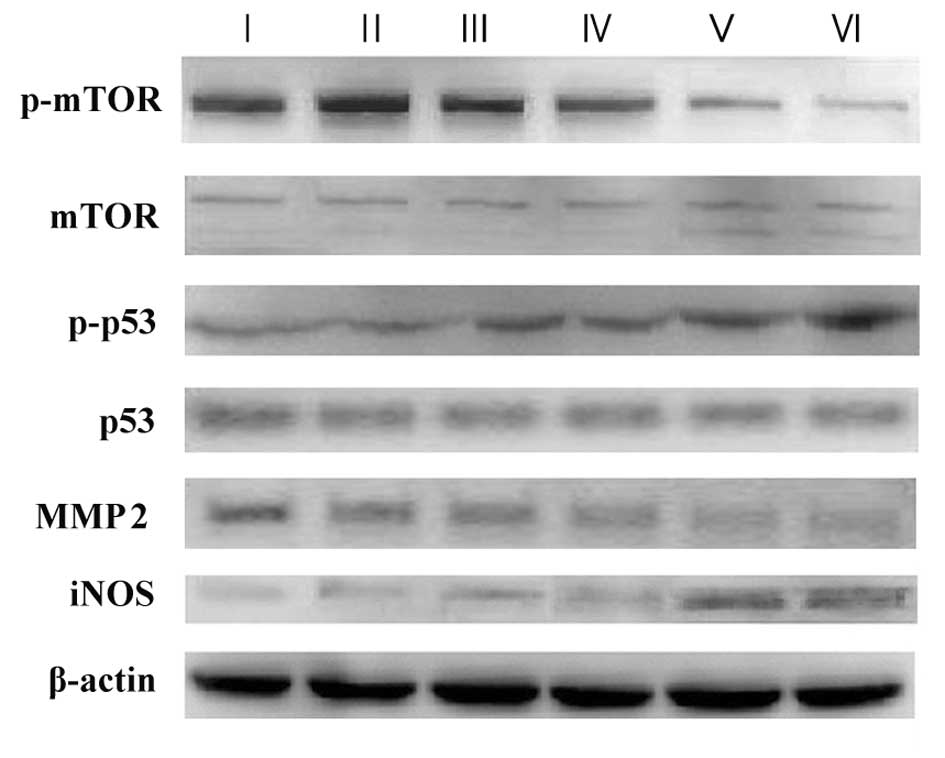|
1
|
Jemal A, Siegel R, Ward E, Murray T, Xu J,
Smigal C and Thun MJ: Cancer statistics, 2006. CA Cancer J Clin.
56:106–130. 2006. View Article : Google Scholar
|
|
2
|
Jamieson ER and Lippard SJ: Structure,
recognition and processing of cisplatin-DNA adducts. Chem Rev.
99:2467–2498. 1999. View Article : Google Scholar : PubMed/NCBI
|
|
3
|
Molina JR, Adjei AA and Jett JR: Advances
in chemotherapy of non-small cell lung cancer. Chest.
130:1211–1219. 2006. View Article : Google Scholar : PubMed/NCBI
|
|
4
|
Xie K and Fidler IJ: Therapy of cancer
metastasis by activation of the inducible nitric oxide synthase.
Cancer Metastasis Rev. 17:55–75. 1998. View Article : Google Scholar : PubMed/NCBI
|
|
5
|
Xie QW, Cho HJ, Calaycay J, Mumford RA,
Swiderek KM, Lee TD, Ding A, Troso T and Nathan C: Cloning and
characterization of inducible nitric oxide synthase from mouse
macrophages. Science. 256:225–228. 1992. View Article : Google Scholar : PubMed/NCBI
|
|
6
|
Heller A: Apoptosis-inducing high (.)NO
concentrations are not sustained either in nascent or in developed
cancers. ChemMedChem. 3:1493–1499. 2008. View Article : Google Scholar : PubMed/NCBI
|
|
7
|
Lala PK and Chakraborty C: Role of nitric
oxide in carcinogenesis and tumour progression. Lancet Oncol.
3:149–156. 2001. View Article : Google Scholar : PubMed/NCBI
|
|
8
|
Fujimoto H, Ando Y, Yamashita T, Terazaki
H, Tanaka Y, Sasaki J, Matsumoto M, Suga M and Ando M: Nitric oxide
synthase activity in human lung cancer. Jpn J Cancer Res.
88:1190–1198. 1997. View Article : Google Scholar : PubMed/NCBI
|
|
9
|
Puhakka A, Kinnula V, Näpänkangas U, Säily
M, Koistinen P, Pääkkö P and Soini Y: High expression of nitric
oxide synthases is a favorable prognostic sign in non-small cell
lung carcinoma. APMIS. 111:1137–1146. 2003. View Article : Google Scholar : PubMed/NCBI
|
|
10
|
Fitzpatrick B, Mehibel M, Cowen RL and
Stratford IJ: iNOS as a therapeutic target for treatment of human
tumors. Nitric Oxide. 19:217–224. 2008. View Article : Google Scholar : PubMed/NCBI
|
|
11
|
Khare PD, Shao-Xi L and Kuroki M, Hirose
Y, Arakawa F, Nakamura K, Tomita Y and Kuroki M: Specifically
targeted killing of carcinoembryonic antigen (CEA)-expressing cells
by a retroviral vector displaying single-chain variable fragmented
antibody to CEA and carrying the gene for inducible nitric oxide
synthase. Cancer Res. 61:370–375. 2001.
|
|
12
|
Xu W, Liu L and Charles IG:
Microencapsulated iNOS-expressing cells cause tumor suppression in
mice. FASEB J. 16:213–215. 2002.PubMed/NCBI
|
|
13
|
Soler MN, Bobé P, Benihoud K, Lemaire G,
Roos BA and Lausson S: Gene therapy of rat medullary thyroid cancer
by naked nitric oxide synthase II DNA injection. J Gene Med.
2:344–352. 2000. View Article : Google Scholar : PubMed/NCBI
|
|
14
|
Lumniczky K and Safrany G: Cancer gene
therapy: combination with radiation therapy and the role of
bystander cell killing in the anti-tumor effect. Pathol Oncol Res.
12:118–124. 2006. View Article : Google Scholar : PubMed/NCBI
|
|
15
|
Siegel R, Ward E, Brawley O and Jemal A:
Cancer statistics, 2011: the impact of eliminating socioeconomic
and racial disparities on premature cancer deaths. CA Cancer J
Clin. 61:212–236. 2011. View Article : Google Scholar : PubMed/NCBI
|
|
16
|
Ropponen KM, Kellokoski JK, Lipponen PK,
Eskelinen MJ, Alanne L, Alhava EM and Kosma VM: Expression of
inducible nitric oxide synthase in colorectal cancer and its
association with prognosis. Scand J Gastroenterol. 35:1204–1211.
2000. View Article : Google Scholar : PubMed/NCBI
|
|
17
|
Raspollini MR, Amunni G, Villanucci A,
Boddi V, Baroni G, Taddei A and Taddei GL: Expression of inducible
nitric oxide synthase and cyclooxygenase-2 in ovarian cancer:
correlation with clinical outcome. Gynecol Oncol. 92:806–812. 2004.
View Article : Google Scholar : PubMed/NCBI
|
|
18
|
Adams C, McCarthy HO, Coulter JA,
Worthington J, Murphy C, Robson T and Hirst DG: Nitric oxide
synthase gene therapy enhances the toxicity of cisplatin in cancer
cells. J Gene Med. 11:160–168. 2009. View Article : Google Scholar : PubMed/NCBI
|
|
19
|
Worthington J, McCarthy HO, Barrett E,
Adams C, Robson T and Hirst DG: Use of the radiation-inducible WAF1
promoter to drive iNOS gene therapy as a novel anti-cancer
treatment. J Gene Med. 6:673–680. 2004. View Article : Google Scholar : PubMed/NCBI
|
|
20
|
Worthington J, Robson T, O’Keeffe M and
Hirst DG: Tumour cell radiosensitization using constitutive (CMV)
and radiation inducible (WAF1) promoters to drive the iNOS gene: a
novel suicide gene therapy. Gene Ther. 9:263–269. 2002. View Article : Google Scholar : PubMed/NCBI
|
|
21
|
McCarthy HO, Worthington J, Barrett E,
Cosimo E, Boyd M, Mairs RJ, Ward C, McKeown SR, Hirst DG and Robson
T: p21 (WAF1)-mediated transcriptional targeting of inducible
nitric oxide synthase gene therapy sensitizes tumours to
fractionated radiotherapy. Gene Ther. 14:246–255. 2007. View Article : Google Scholar
|
|
22
|
Coulter JA, McCarthy HO, Worthington J,
Robson T, Scott S and Hirst DG: The radiation-inducible pE9
promoter driving inducible nitric oxide synthase radiosensitizes
hypoxic tumour cells to radiation. Gene Ther. 15:495–503. 2008.
View Article : Google Scholar : PubMed/NCBI
|
|
23
|
Wang Z, Cook T, Alber S, Liu K, Kovesdi I,
Watkins SK, Vodovotz Y, Billiar TR and Blumberg D: Adenoviral gene
transfer of the human inducible nitric oxide synthase gene enhances
the radiation response of human colorectal cancer associated with
alterations in tumor vascularity. Cancer Res. 64:1386–1395. 2004.
View Article : Google Scholar : PubMed/NCBI
|
|
24
|
Evig CB, Kelley EE, Weydert CJ, Chu Y,
Buettner GR and Burns CP: Endogenous production and exogenous
exposure to nitric oxide augment doxorubicin cytotoxicity for
breast cancer cells but not cardiac myoblasts. Nitric Oxide.
10:119–129. 2004. View Article : Google Scholar
|
|
25
|
Wink DA, Cook JA, Christodoulou D, Krishna
MC, Pacelli R, Kim S, DeGraff W, Gamson J, Vodovotz Y, Russo A and
Mitchell JB: Nitric oxide and some nitric oxide donor compounds
enhance the cytotoxicity of cisplatin. Nitric Oxide. 1:88–94. 1997.
View Article : Google Scholar : PubMed/NCBI
|
|
26
|
Son KK and Hall KJ: Nitric oxide-mediated
tumor cell killing of cisplatin-based interferon-gamma gene therapy
in murine ovarian carcinoma. Cancer Gene Ther. 7:1324–1328.
2000.PubMed/NCBI
|
|
27
|
Konovalova NP, Goncharova SA, Volkova LM,
Rajewskaya TA, Eremenko L and Korolev AM: Nitric oxide donor
increases the efficiency of cytostatic therapy and retards the
development of drug resistance. Nitric Oxide. 8:59–64. 2003.
View Article : Google Scholar : PubMed/NCBI
|
|
28
|
Chen JH, Lin HH, Chiang TA, Hsu JD, Ho HH,
Lee YC and Wang CJ: Gaseous nitrogen oxide promotes human lung
cancer cell line A549 migration, invasion, and metastasis via
iNOS-mediated MMP-2 production. Toxicol Sci. 106:364–375. 2008.
View Article : Google Scholar : PubMed/NCBI
|
|
29
|
Kisley LR, Barrett BS, Bauer AK,
Dwyer-Nield LD, Barthel B, Meyer AM, Thompson DC and Malkinson AM:
Genetic ablation of inducible nitric oxide synthase decreases mouse
lung tumorigenesis. Cancer Res. 62:6850–6856. 2002.PubMed/NCBI
|
|
30
|
Chen X, Wang X, Wang Y, Yang L, Hu J, Xiao
W, Fu A, Cai L, Li X, Ye X, Liu Y, et al: Improved tumor-targeting
drug delivery and therapeutic efficacy by cationic liposome
modified with truncated bFGF peptide. J Control Release. 145:17–25.
2010. View Article : Google Scholar : PubMed/NCBI
|
|
31
|
Shamimi-Noori S, Yeow W-S, Ziauddin MF,
Xin H, Tran TL, Xie J, Loehfelm A, Patel P, Yang J, Schrump DS, et
al: Cisplatin enhances the antitumor effect of tumor necrosis
factor-related apoptosis-inducing ligand gene therapy via
recruitment of the mitochondria-dependent death signaling pathway.
Cancer Gene Ther. 15:356–370. 2008. View Article : Google Scholar
|
|
32
|
Ito I, Ji L, Tanaka F, Saito Y, Gopalan B,
Branch CD, Xu K, Atkinson EN, Bekele BN, Stephens LC, et al:
Liposomal vector mediated delivery of the 3p FUS1 gene demonstrates
potent antitumor activity against human lung cancer in vivo. Cancer
Gene Ther. 11:733–739. 2004. View Article : Google Scholar
|
|
33
|
Wei YQ, Wang QR, Zhao X, Yang L, Tian L,
Lu Y, Kang B, Lu CJ, Huang MJ, Lou YY, et al: Immunotherapy of
tumors with xenogeneic endothelial cells as a vaccine. Nat Med.
6:1160–1166. 2000. View
Article : Google Scholar : PubMed/NCBI
|
|
34
|
Fraser M, Chan SL, Chan SS, Fiscus RR and
Tsang BK: Regulation of p53 and suppression of apoptosis by the
soluble guanylyl cyclase/cGMP pathway in human ovarian cancer
cells. Oncogene. 25:2203–2212. 2006. View Article : Google Scholar : PubMed/NCBI
|
|
35
|
Nguyen DM, Spitz FR, Yen N, Cristiano RJ
and Roth JA: Gene therapy for lung cancer: enhancement of tumor
suppression by a combination of sequential systemic cisplatin and
adenovirus-mediated p53 gene transfer. J Thorac Cardiovasc Surg.
112:1372–1377. 1996. View Article : Google Scholar : PubMed/NCBI
|
|
36
|
Cook T, Wang Z, Alber S, Liu K, Watkins
SC, Vodovotz Y, Billiar TR and Blumberg D: Nitric oxide and
ionizing radiation synergistically promote apoptosis and growth
inhibition of cancer by activating p53. Cancer Res. 64:8015–8021.
2004. View Article : Google Scholar : PubMed/NCBI
|
|
37
|
Wangpaichitr M, Wu C, You M, Kuo MT, Feun
L, Lampidis T and Savaraj N: Inhibition of mTOR restores cisplatin
sensitivity through down-regulation of growth and anti-apoptotic
proteins. Eur J Pharmacol. 591:124–127. 2008. View Article : Google Scholar : PubMed/NCBI
|
|
38
|
Stewart DJ: Mechanisms of resistance to
cisplatin and carboplatin. Crit Rev Oncol Hematol. 63:12–31. 2007.
View Article : Google Scholar : PubMed/NCBI
|
|
39
|
Mabuchi S, Kawase C, Altomare DA,
Morishige K, Sawada K, Hayashi M, Tsujimoto M, Yamoto M,
Klein-Szanto AJ, Schilder RJ, et al: mTOR is a promising
therapeutic target both in cisplatin-sensitive and
cisplatin-resistant clear cell carcinoma of the ovary. Clin Cancer
Res. 15:5404–5413. 2009. View Article : Google Scholar : PubMed/NCBI
|
|
40
|
Templeton NS, Lasic DD, Frederik PM, Strey
HH, Roberts DD and Pavlakis GN: Improved DNA:liposome complexes for
increased systemic delivery and gene expression. Nat Biotechnol.
15:647–652. 1997. View Article : Google Scholar : PubMed/NCBI
|
|
41
|
Keshamouni V, Arenberg D and Kalemkeriam
G: Lung Cancer Metastasis: Novel Biological Mechanisms and Impact
on Clinical Practice. Springer; New York: pp. 1–395. 2009
|
|
42
|
Guertin DA and Sabatini DM: Defining the
role of mTOR in cancer. Cancer Cell. 12:9–23. 2007. View Article : Google Scholar
|
|
43
|
Orucevic A, Bechberger J, Green AM,
Shapiro RA, Billiar TR and Lala PK: Nitric-oxide production by
murine mammary adenocarcinoma cells promotes tumor-cell
invasiveness. Int J Cancer. 81:889–896. 1999. View Article : Google Scholar : PubMed/NCBI
|
|
44
|
Obara H and Harasawa R: Nitric oxide
causes anoikis through attenuation of E-cadherin and activation of
caspase-3 in human gastric carcinoma AZ-521 cells infected with
Mycoplasma hyorhinis. J Vet Med Sci. 72:869–874. 2010. View Article : Google Scholar : PubMed/NCBI
|
|
45
|
Bjorklund M and Koivunen E:
Gelatinase-mediated migration and invasion of cancer cells. Biochim
Biophys Acta. 1755:37–69. 2005.PubMed/NCBI
|
|
46
|
Karam AK, Santiskulvong C, Fekete M, Zabih
S, Eng C and Dorigo O: Cisplatin and PI3kinase inhibition decrease
invasion and migration of human ovarian carcinoma cells and
regulate matrix-metalloproteinase expression. Cytoskeleton
(Hoboken). 67:535–544. 2010.
|
|
47
|
Urso L, Muscella A, Calabriso N, Vetrugno
C, Jiménez E, Montiel M and Marsigliante S: Effects of cisplatin on
matrix metalloproteinase-2 in transformed thyroid cells. Biochem
Pharmacol. 79:810–816. 2010. View Article : Google Scholar : PubMed/NCBI
|
|
48
|
Ridnour LA, Thomas DD, Switzer C,
Flores-Santana W, Isenberg JS, Ambs S, Roberts DD and Wink DA:
Molecular mechanisms for discrete nitric oxide levels in cancer.
Nitric Oxide. 19:73–76. 2008. View Article : Google Scholar : PubMed/NCBI
|















